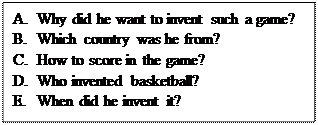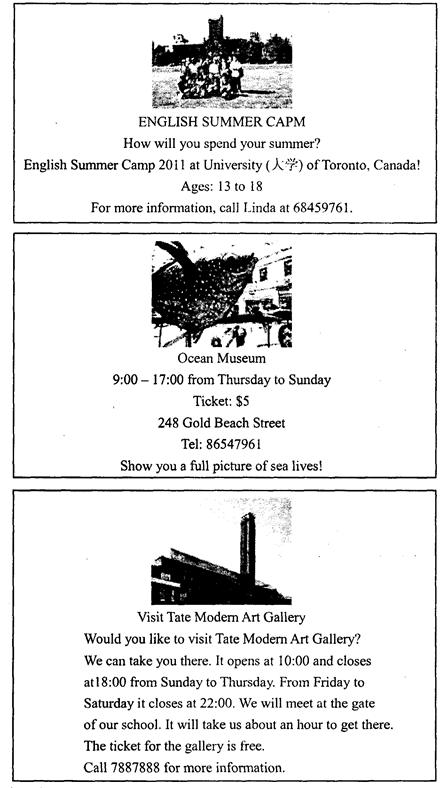
A Canadian woman and her teenage son got in the taxi and asked me to take them to Baiyun airport. They were going back to 36 .We had a nice conversation together and when they got out, they thanked me a lot.
When my 37 passenger got in, he gave me a purse and said he found it on the back 38 .I looked at the purse and knew it 39 the Canadian woman.
I found a telephone number in the purse and phoned the number. The Canadian woman
40 . She asked me to go back to the airport and return the 41 . So I turned off my taxi light and started for the 42 . On the way, five or six people tried to 43 me while I was driving through the city, but I didn’t stop. I was doing a good thing!
Forty minutes 44 ,I arrived at the airport. The woman was standing outside the terminal building and looking worried. I gave back the purse. She was so 45 . She just laughed. She
said, “You’re really my favourite Chinese.”
| 36. A. China | B. England | C. Canada |
| 37. A. next | B. last | C. familiar |
| 38. A. room | B. seat | C. street |
| 39. A. belonged to | B. depended on | C. stood for |
| 40. A. laughed | B. repeated | C. answered |
| 41. A. money | B. purse | C. number |
| 42. A. city | B. airport | C. building |
| 43. A. help | B. stop | C. catch |
| 44. A. later | B. earlier | C. sooner |
| 45. A. sad | B. worried | C. happy |
 阅读快车系列答案
阅读快车系列答案科目:初中英语 来源: 题型:

查看答案和解析>>
科目:初中英语 来源: 题型:
查看答案和解析>>
科目:初中英语 来源: 题型:

| A.doesn't speak English well | B.doesn't like the university |
| C.is 20 years old | D.isn't a Canadian |
| A.¥5 | B.¥10. | C.¥15 | D.It's free. |
| A.On a poster. | B.In a textbook. | C.In a letter. | D.In a guide book. |
查看答案和解析>>
科目:初中英语 来源:2011-2012学年北京市大兴区初三上学期期末考试英语试卷(解析版) 题型:阅读理解
Do you speak English? Do you speak e-mail English? Maybe you don’t. E-mail English is a new kind of English that many people use to save time. A lot of e-mail English words come from a computer program called QQ, which means I seek(寻找)you. Ian Lancashire, a Canadian teacher, likes QQ, “People can use QQ to talk with each other using computer. But, you have to be able to type quickly or the other person will be bored. So e-mail English can give some help.”
A message in e-mail English mostly uses two kinds of new words. The first kind is made up of the first letters of the words. These are called acronyms. The second kind is homophones,letter combination(合并), symbols that sound like other words.
Acronyms in an e-mail save space and time. It takes a long time to write by the way. BTW is much faster. Other acronyms are F2F which stands for face to face, CSL for can’t stop laughing and DBEYR for don’t believe everything you read! Some of the acronyms look like strange words, such as SWAK. But this one means sealed(封口) with a kiss.
Homophones often use letters and numbers that sound like words or parts of words. For example, 8 sound like—eat in great, to save time, people write gr8. Another example is CU for see you or sometimes CU l8r (see you later)
The number 2 is used for to or too and the number 4 is used instead of for.
Another part of e-mail is emotive symbols(表情符号) which make faces when you look at them sideways. The most common emotive, is the happy face :). A comma (逗号) is often used to help add other parts of the face and show different expressions.
E-mail English is fun. An e-mail message with lots of e-mail English starts to look like secret code(密码). Your best friend will probably understand it, but your parents and teachers may not. In fact, many teachers don’t like e-mail English. It’s not just because they can’t comprehend what it means. It’s because students start to use e-mail English in their everyday writing. E-mail English is great for writing quickly. But most teachers say that e-mail English should only be used in e-mails to one’s friends.
1.What does the writer talk about in the first paragraph?
A. How to read new e-mail words.
B. How new e-mail words are made.
C. Why people use e-mail English.
D. Canadian teachers and their e-mails.
2.The underlined word “comprehend” in the last paragraph means “_______”.
A. accept B. understand C. guess D. prefer
3.What do teachers insist according to the passage?
A. Parents will have to learn some e-mail English.
B. E-mail English will develop our everyday writing.
C. E-mail English can’t be used among schoolmates.
D. E-mail English shouldn’t be used in school writing.
4.What’s the title for this passage?
A. E-mail English on Computer. B. American E-mail English.
C. The Forms of E-mail English. D. The Changing of English.
查看答案和解析>>
科目:初中英语 来源:2012学年江苏省初一5月月考英语试卷(解析版) 题型:阅读理解


1. Tom can't join the summer camp because he _______.
A. doesn't speak English well B. doesn't like the university
C. is 20 years old D. isn't a Canadian
2.How much will you pay when you visit Tate Modem Art Gallery with your parents?
A.¥5 B. ¥10. C.¥15 D. It's free.
3.Where can we see the above reading?
A. On a poster. B. In a textbook. C. In a letter. D. In a guide book.
查看答案和解析>>
湖北省互联网违法和不良信息举报平台 | 网上有害信息举报专区 | 电信诈骗举报专区 | 涉历史虚无主义有害信息举报专区 | 涉企侵权举报专区
违法和不良信息举报电话:027-86699610 举报邮箱:58377363@163.com